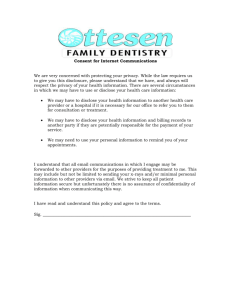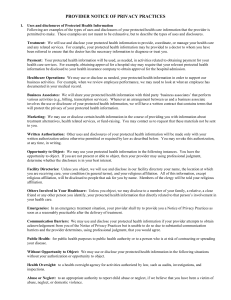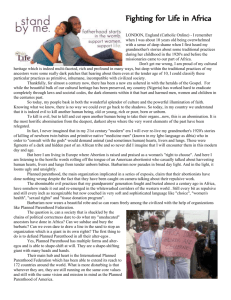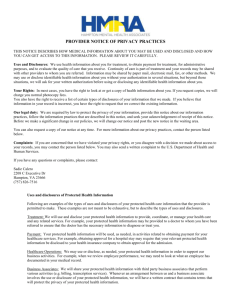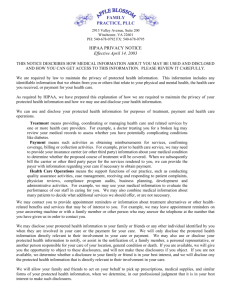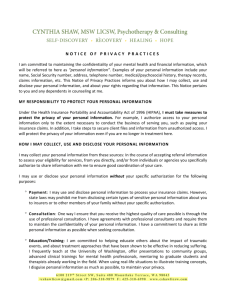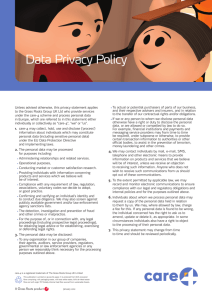notice of health information privacy practices
advertisement
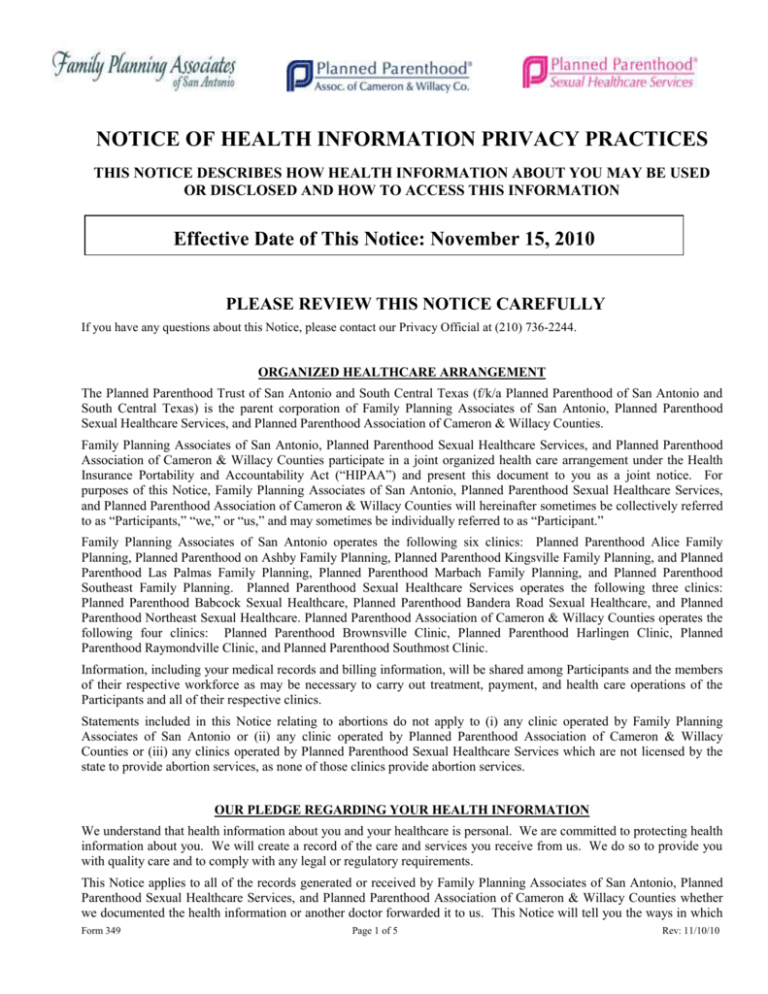
NOTICE OF HEALTH INFORMATION PRIVACY PRACTICES THIS NOTICE DESCRIBES HOW HEALTH INFORMATION ABOUT YOU MAY BE USED OR DISCLOSED AND HOW TO ACCESS THIS INFORMATION Effective Date of This Notice: November 15, 2010 PLEASE REVIEW THIS NOTICE CAREFULLY If you have any questions about this Notice, please contact our Privacy Official at (210) 736-2244. ORGANIZED HEALTHCARE ARRANGEMENT The Planned Parenthood Trust of San Antonio and South Central Texas (f/k/a Planned Parenthood of San Antonio and South Central Texas) is the parent corporation of Family Planning Associates of San Antonio, Planned Parenthood Sexual Healthcare Services, and Planned Parenthood Association of Cameron & Willacy Counties. Family Planning Associates of San Antonio, Planned Parenthood Sexual Healthcare Services, and Planned Parenthood Association of Cameron & Willacy Counties participate in a joint organized health care arrangement under the Health Insurance Portability and Accountability Act (“HIPAA”) and present this document to you as a joint notice. For purposes of this Notice, Family Planning Associates of San Antonio, Planned Parenthood Sexual Healthcare Services, and Planned Parenthood Association of Cameron & Willacy Counties will hereinafter sometimes be collectively referred to as “Participants,” “we,” or “us,” and may sometimes be individually referred to as “Participant.” Family Planning Associates of San Antonio operates the following six clinics: Planned Parenthood Alice Family Planning, Planned Parenthood on Ashby Family Planning, Planned Parenthood Kingsville Family Planning, and Planned Parenthood Las Palmas Family Planning, Planned Parenthood Marbach Family Planning, and Planned Parenthood Southeast Family Planning. Planned Parenthood Sexual Healthcare Services operates the following three clinics: Planned Parenthood Babcock Sexual Healthcare, Planned Parenthood Bandera Road Sexual Healthcare, and Planned Parenthood Northeast Sexual Healthcare. Planned Parenthood Association of Cameron & Willacy Counties operates the following four clinics: Planned Parenthood Brownsville Clinic, Planned Parenthood Harlingen Clinic, Planned Parenthood Raymondville Clinic, and Planned Parenthood Southmost Clinic. Information, including your medical records and billing information, will be shared among Participants and the members of their respective workforce as may be necessary to carry out treatment, payment, and health care operations of the Participants and all of their respective clinics. Statements included in this Notice relating to abortions do not apply to (i) any clinic operated by Family Planning Associates of San Antonio or (ii) any clinic operated by Planned Parenthood Association of Cameron & Willacy Counties or (iii) any clinics operated by Planned Parenthood Sexual Healthcare Services which are not licensed by the state to provide abortion services, as none of those clinics provide abortion services. OUR PLEDGE REGARDING YOUR HEALTH INFORMATION We understand that health information about you and your healthcare is personal. We are committed to protecting health information about you. We will create a record of the care and services you receive from us. We do so to provide you with quality care and to comply with any legal or regulatory requirements. This Notice applies to all of the records generated or received by Family Planning Associates of San Antonio, Planned Parenthood Sexual Healthcare Services, and Planned Parenthood Association of Cameron & Willacy Counties whether we documented the health information or another doctor forwarded it to us. This Notice will tell you the ways in which Form 349 Page 1 of 5 Rev: 11/10/10 we may use or disclose health information about you. This Notice also describes your rights to the health information we keep about you and describes certain obligations we have regarding the use and disclosure of your health information. Our pledge regarding your health information is backed-up by federal law. The privacy and security provisions of HIPAA require us to: Make sure that health information that identifies you is kept private; Make available this Notice of our legal duties and privacy practices with respect to health information about you; and Follow the terms of the Notice that is currently in effect. HOW WE MAY USE AND DISCLOSE HEALTH INFORMATION ABOUT YOU The following categories describe different ways that we may use or disclose health information about you. Unless otherwise noted, each of these uses and disclosures may be made without your permission. For each category of use or disclosure, we will explain what we mean and give some examples. Not every use or disclosure in a category will be listed. However, unless we ask for a separate authorization, all of the ways we are permitted to use and disclose information will fall within one of the categories. For Treatment. We may use health information about you to provide you with healthcare treatment and services. We may disclose health information about you to doctors, nurses, technicians, health students, volunteers or other personnel who are involved in your care. These individuals may work at our offices, at a hospital if you are hospitalized, at another doctor’s office, or at a lab, pharmacy, or other healthcare provider to whom we may refer you for consultation, to take xrays, to perform lab tests, to have prescriptions filled, or for other treatment purposes. For example, a doctor treating you may need to know if you have diabetes because diabetes may slow the healing process. We may provide that information to a physician treating you at another institution. For Payment. We may use and disclose health information about you so that the treatment and services you receive from us may be billed to and payment collected from you, an insurance company, a state Medicaid agency or a third party. For example, we may need to give your health insurance plan information about your office visit so your health plan will pay us or reimburse you for the visit. Alternatively, we may need to give your health information to the state Medicaid agency so that we may be reimbursed for providing services to you. In some instances, we may need to tell your health plan about a treatment you are going to receive to obtain prior approval or to determine whether your plan will cover the treatment. For Healthcare Operations. We may use and disclose health information about you for operations of the healthcare practice of a Participant. These uses and disclosures are necessary to run such practices and to make sure that all of our patients receive quality care. For example, we may use health information to review our treatment and services and to evaluate the performance of our respective staffs in caring for you. We may also combine health information about many patients to decide what additional services we should offer, what services are not needed, whether certain new treatments are effective, or to compare how we are doing with others and to see where we can make improvements. We may remove information that identifies you from this set of health information so others may use it to study healthcare delivery without learning who our specific patients are. Appointment Reminders. We may use and disclose health information to contact you as a reminder that you have an appointment. Please let us know if you do not wish to have us contact you concerning your appointment, or if you wish to have us use a different telephone number or address to contact you for this purpose. Research. There may be situations where we want to use and disclose health information about you for research purposes. For example, a research project may involve comparing the efficacy of one medication over another. For any research project that uses your health information, we will either obtain an authorization from you or ask an Institutional Review or Privacy Board to waive the requirement to obtain authorization. A waiver of authorization will be based upon assurances from a review board that the researchers will adequately protect your health information. As Required By Law. We will disclose health information about you when required to do so by federal, state, or local law. To Avert a Serious Threat to Health or Safety. We may use and disclose health information about you when necessary to prevent a serious threat to your health and safety or the health and safety of the public or another person. Any disclosure, however, would only be to someone in a position to help prevent the threat. Form 349 Page 2 of 5 Rev: 11/10/10 Military and Veterans. If you are a member of the armed forces or are separated/discharged from military services, we may release health information about you as required by military command authorities or the Department of Veterans Affairs as may be applicable. We may also release health information about foreign military personnel to the appropriate foreign military authorities. Workers' Compensation. We may release health information about you for workers' compensation or similar programs. These programs provide benefits for work-related injuries or illness. Public Health Risks. We may disclose health information about you for public health activities. These activities generally include the following: To prevent or control disease, injury or disability; To report births and deaths; To report child abuse or neglect; To report reactions to medications or problems with products; To notify people of recalls of products they may be using; To notify a person who may have been exposed to a disease or may be at risk for contracting or spreading a disease or condition; To notify the appropriate government authority if we believe a patient has been the victim of abuse, neglect, or domestic violence. We will only make this disclosure if you agree or when required or authorized by law. Health Oversight Activities. We may disclose health information to a health oversight agency for activities authorized by law. These oversight activities include, for example, audits, investigations, inspections, and licensure. These activities are necessary for the government to monitor the health care system, government programs, and compliance with civil rights laws. Lawsuits and Disputes. If you are involved in a lawsuit or a dispute, we may disclose health information about you in response to an order issued by a court or administrative tribunal. We may also disclose health information about you in response to a subpoena, discovery request, or other lawful process by someone else involved in the dispute, but only after receiving reasonable assurances that efforts have been made to tell you about the request and you have had time to obtain an order protecting the information requested. Law Enforcement. We may release health information if asked to do so by a law enforcement official: In response to a court order, subpoena, warrant, summons or similar process; To identify or locate a suspect, fugitive, material witness, or missing person; If you are the victim of a crime and we are unable to obtain your consent; About a death we believe may be the result of criminal conduct; In an instance of criminal conduct at our facility; and In emergency circumstances to report a crime; the location of the crime or victims; or the identity, description, or location of the person who committed the crime. Such releases of information will be made only after efforts have been made to tell you about the request and you have time to obtain an order protecting the information requested. Coroners, Health Examiners and Funeral Directors. We may release health information to a coroner or health examiner. This may be necessary, for example, to identify a deceased person or determine the cause of death. We may also release health information about patients to funeral directors as necessary to carry out their duties. Inmates. If you are an inmate of a correctional institution or under the custody of a law enforcement official, we may release health information about you to the correctional institution or law enforcement official. This release would be necessary: (1) for the institution to provide you with healthcare; (2) to protect your health and safety or the health and safety of others; or (3) for the safety and security of the correctional institution. YOUR RIGHTS REGARDING HEALTH INFORMATION ABOUT YOU You have the following rights regarding health information we maintain about you: Right to Inspect and Copy. You have certain rights to inspect and copy health information that may be used to make decisions about your care. Usually, this information includes health and billing records. This information does not include psychotherapy notes. Form 349 Page 3 of 5 Rev: 11/10/10 To inspect and copy health information that may be used to make decisions about you, you must submit your request in writing to our Privacy Official on a form provided by us. If you request a copy of your health information, we may charge a fee for the costs of locating, copying, mailing or other supplies and services associated with your request. We may deny your request to inspect and copy in certain very limited circumstances. If you are denied access to health information, you may in certain instances request that the denial be reviewed. Another licensed healthcare professional chosen by our practice will review your request and the denial. The person conducting the review will not be the person who denied your initial request. We will comply with the outcome of the review. Right to Amend. If you feel that health information we have about you is incorrect or incomplete, you may ask us to amend the information. You have the right to request an amendment for as long as we keep the information. To request an amendment, you must submit your request in writing to our Privacy Official on a form provided by us. We may deny your request for an amendment if it is not the form provided by us and/or does not include a reason to support the request. In addition, we may deny your request if you ask us to amend information that: Was not created by us, unless the person or entity that created the information is no longer available to make the amendment; Is not part of the health information kept by or for our practice; Is not part of the information which you would be permitted to inspect and copy; or Is accurate and complete. Any amendment we make to your health information will be disclosed to those with whom we disclose information as previously specified. Right to an Accounting of Disclosures. You have the right to request a list (accounting) of any disclosures of your health information we have made, except for uses and disclosures for treatment, payment, and health care operations, as previously described. To request this list of disclosures, you must submit your request in writing to our Privacy Official on a form that we will provide to you. Your request must state a time period that may not be longer than six years and may not include dates before April 14, 2003 [The compliance date of the Privacy Regulation]. The first list of disclosures you request within a 12-month period will be free. For additional lists, we may charge you for the costs of providing the list. We will notify you of the cost involved, and you may choose to withdraw or modify your request at that time before any costs are incurred. We will mail you a list of disclosures in paper form within 30 days of your request, or notify you if we are unable to supply the list within that time period and by what date we can supply the list; but this date should not exceed a total of 60 days from the date you made the request. Right to Request Restrictions. You have the right to request a restriction or limitation on the health information we use or disclose about you for treatment, payment, or health care operations. You also have the right to request a limit on the health information we disclose about you to someone who is involved in your care or the payment for your care. For example, you could ask that access to your health information be denied to a particular member of our workforce who is known to you personally. While we will try to accommodate your request for restrictions under this paragraph, we are not required to do so if it is not feasible for us to ensure our compliance with law or we believe it will negatively impact the care we may provide you. If we do agree, we will comply with your request unless the information is needed to provide you emergency treatment. You also have the right to request that we not disclose protected health information to a health plan for purposes of carrying out payment or health care operations if such protected health information pertains solely to a health care item or service for which you have paid out of pocket in-full. To request a restriction, you must make your request in writing to our Privacy Official on a form that we will provide you. In your request, you must tell us what information you want to limit and to whom you want the limits to apply. Right to Request Confidential Communications. You have the right to request that we communicate with you about health matters in a certain manner or at a certain location. For example, you can ask that we only contact you at work or by mail to a post office box. During our intake process, we will ask you how you wish to receive communications about your health care or for any other instructions on notifying you about your health information. We will accommodate all reasonable requests. Right to a Paper Copy of This Notice. You have the right to obtain a paper copy of this Notice at any time upon request. You may also obtain a copy of this Notice at our website www.pptrust.org. Form 349 Page 4 of 5 Rev: 11/10/10 Right to Receive Notice of a Breach. We are required to notify you by first class mail or by e-mail (if you have indicated a preference to receive information by e-mail), of any breaches of Unsecured Protected Health Information without unreasonable delay and in no case later than 60 days following the discovery of the breach. “Unsecured Protected Health Information” is information that is not secured through the use of a technology or methodology identified by the Secretary of the U.S. Department of Health and Human Services to render the Protected Health Information unusable, unreadable, and undecipherable to unauthorized users. The notice is required to include the following information: • a brief description of the breach, including the date of the breach and the date of its discovery, if known; • a description of the type of Unsecured Protected Health Information involved in the breach; • steps you should take to protect yourself from potential harm resulting from the breach; • a brief description of actions we are taking to investigate the breach, mitigate losses, and protect against further breaches; and • contact information, including a toll-free telephone number, e-mail address, Web site or postal address to permit you to ask questions or obtain additional information. In the event the breach involves 10 or more patients whose contact information is insufficient or out of date, we will post a notice of the breach on the home page of our Web site or in a major print or broadcast media. If the breach involves more than 500 patients in a state or jurisdiction, we will send notices to prominent media outlets. If the breach involves more than 500 patients, we are required to notify the Secretary of the U.S. Department of Health and Human Services when we notify you of the breach. We also are required to submit an annual report to the Secretary of a breach that involved less than 500 patients during the year and will maintain a written log of breaches involving less than 500 patients. MINORS AND PERSONS WITH GUARDIANS Certain minors have all the rights outlined in this Notice with respect to health information relating to reproductive healthcare, except for abortion and in emergency situations or when the law requires reporting of abuse and neglect. In the case of abortion, if a parent provides consent to your abortion, the parent has all the rights outlined in this Notice, including the right to access the health information relating to abortion. However, if you obtain a judicial bypass of the consent requirement, you have the same rights as an adult with respect to health information relating to your abortion. If you are a minor or a person with a guardian obtaining healthcare that is not related to reproductive health, your parent or legal guardian may have the right to access your medical record and make certain decisions regarding the uses and disclosures of your health information. CHANGES TO THIS NOTICE We reserve the right to change this Notice. We reserve the right to make the revised Notice effective for health information we already have about you as well as any information we receive in the future. We will post a copy of the current Notice in our facilities and on our website. This Notice contains the effective date on the first page. COMPLAINTS If you believe your privacy rights have been violated, you may file a complaint with us or with the Secretary of the Department of Health and Human Services. To file a complaint with us, contact our Privacy Official at (210) 736-2244. All complaints must be submitted in writing. You will not be penalized for filing a complaint. OTHER USES OF HEALTH INFORMATION Other uses and disclosures of health information not covered by this Notice or the laws that apply to us will be made only with your written permission. If you provide us permission to use or disclose health information about you, you may revoke that permission, in writing, at any time. If you revoke your permission, we will no longer use or disclose health information about you for the reasons covered by your written authorization. You understand that we are unable to take back any disclosures we have already made with your permission, and that we are required to retain the records of the care that we provided to you. Form 349 Page 5 of 5 Rev: 11/10/10
